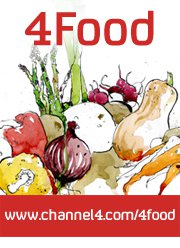
As much as I love Nigella Lawson, cast your eye over the recipes in her latest book, Nigella Express, and it becomes obvious that healthy eating and sustainable food shopping were not really at the front of her mind. Chocolate peanut butter sauce anybody? And just don’t get me started on the disposable oven trays and plastic bags. But anyway, enough of the griping, there are some great quick recipes in the book and I do think she has really hit on something with all of those tasty recipes using canned beans and pulses (chickpeas with rocket and sherry, cod and cannellini, and white bean mash to name just a few of them). Canned beans might just might be the perfect convenience food for the modern age; quick, comforting, healthy, agriculturally sustainable and nutritionally multi-tasking (counting as a “five a day” vegetable while also being a great veggie and vegan source of dietary protein).
A huge range of plant foods fit under that interchangeably used legumes/beans banner (lentils, peanuts, beans, chickpeas, soya beans to name a few). The ones I am talking about here are all those lovely types of beans that we dry or buy in cans to eat at our leisure later. Cannellini beans (white kidney), borlotti beans (cranberry), chickpeas (garbanzo), black beans, kidney beans and butter beans (lima), to name just a few.
Most vegetarians and vegans have known that beans are a good source of protein for years and the amino acid make-up of their proteins is a perfect complement to many of the other common plant protein sources. Fiddly protein combining for vegans and vegetarians we now know isn’t necessary, but it helps to eat from a wide variety of sources across the day, advice that applies just as much to us growing band of nearly-veggies. But the health benefits of beans go far beyond providing this basic nutritional cornerstone. Beans are a key part the much-researched Mediterranean diet, when eaten with lots of other tasty foods like fresh fruit and vegetables, olive oil, nuts, fish, wholegrains and the odd glass of wine. Research in this area is still ongoing but at the moment there is very good evidence that this diet can reduce the risk of heart disease, with newer evidence emerging which suggests that this type of diet also reduces the risk of several major cancers, when compared with the diets people more typically follow in the UK and United States. Some of this goodness is likely to be down to the soluble fibre found in beans, the type that seems to lower cholesterol.
Enough about us now, what about the environment? Beans (or legumes) are an amazing crop. They have the ability to ‘fix’ nitrogen, co-existing with bacteria that are able to take nitrogen from the air and convert it into a usable form for the plant to grow. The upshot of this is that less artificial fertilizer is needed and even better, as the spent crop dies back at the end of the growing season it can return some of the fixed nitrogen to the earth. Organic and ecologically friendly farming methods have renewed interest in the age-old practice of crop rotation (you know, the one you learnt about at school), whereby farmers follow a crop of legumes with a cereal or vegetable crop that can then make good use of this added nitrogen.
Unlike many plant-based foods, beans are easily dried or canned to put away for the winter when fresh produce becomes less readily available, reducing reliance on expensively imported produce. Swedish research suggests that as a protein source beans are relatively energy efficient; cooked beans used between 5 and 20 MJ of energy per kg across their full lifecycle (from growing to serving), with even the least energy efficient category of beans (canned, imported beans) being positively saintly compared with 75 MJ per kg for beef and a shocking 220 MJ per kg for shelled shrimps (manufacturing practices will vary between countries and brands but this research still gives a useful indication)
More to eat
A few suggestions for quick meals based on a can of beans:
- Recipe to follow for my version of Nigella’s Tuna and Beans, a quick and easy store cupboard lunch recipe that takes 5 minutes to make.
- Make an instant houmous from mashed, warmed chickpeas with lemon juice, a little olive oil and paprika or chilli. Serve with pitta bread and sticks of carrot, pepper and celery.
- Add a can of beans to homemade or store bought soup to turn it into a more substantial meal.
- Fry up some onions, celery and garlic before adding canned tomatoes, beans and ground coriander, cumin and chilli to make spicy sauce to have with tortilla or rice (good with a dollop of natural yogurt on the top).
- Stew up a big batch of a quorn or soy mince chilli and keep individual portions in the freezer for when you can’t be bothered to cook.
- Mashed a can of white beans with créme fraiche, yogurt or olive oil and a spoonful of grain mustard as a quick alternative to mashed potato
- Beans on toast, of course!
More to read
- The greening of the green revolution: an introduction to why old-fashioned methods such as crop rotation can work as well as modern high-intensity agriculture (from Nature)
- How to cook dried beans, from Culinate (canned beans don’t really warrant such instructions!)
- Health benefits of pulses, nuts and seeds from the Food Standards Agency
- Evidence for the Mediterranean diet from Bandolier (Evidence based thinking about healthcare)

 Come join me on Twitter
Come join me on Twitter Sophie Roberts is a registered dietitian based in Oxford, UK. She loves combining her nutrition know-how with a sustainable approach to buying and preparing food and shares her tips and recipes here at Mostly Eating.
Sophie Roberts is a registered dietitian based in Oxford, UK. She loves combining her nutrition know-how with a sustainable approach to buying and preparing food and shares her tips and recipes here at Mostly Eating. 
{ 14 comments }
So much here to agree with. Just one thought, though, which is … beans are great from a can when you’re in a hurry, but they are MUCH MUCH tastier when you soak and cook them yourself; I have a feeling that they may well be more environmentally friendly that way, too (although, of course, at some point, someone’s got to cook them). It’s just that once I started thinking of canned beans as a standby, it became easier to think of soaking and cooking them. And did you see Jamie O’s natty little pressure cooker on his show the other week? They’ve come a long way in a short time.
Great suggestions for beans, esp the mash … when you say white beans, do you mean cannellini which I love or butter beans which I loathe??
Hi Joanna, you are so right about dried beans tasting better. The research paper that I was reading calculated that dried beans use less energy (overall), while canned beans still use massively less than most other protein rich foods. So yes, it sounds like dried are even better for the environment and tastier, with the trade-off being that they require that bit more forward planning.
I am all too rarely organised enough to have soaked my beans in advance, so I should check out Jamie’s pressure cooker idea (there’s a debate between buying a pressure cooker and a rice cooker in our house at the moment!)
Re. which beans for what, I generally use cannellini beans to mash up and then butter beans to make homemade baked beans, but I haven’t specified as sometimes it just boils down to what we have left in the cupboard. I’m impressed that you have such strong feelings about butter beans :-) Is it the floury texture? My other half hates them if they aren’t really, really well cooked.
Hi Sophie, what a wonderful, information packed post. Dried beans are a major staple in my pantry. But, I must confess, for a quick lunch of humus, I use canned chickpeas. I rinse them before I make my humus. Right you are though, nothing like a nice pot of simmering beans on the stove! Cheers!
I’m also a fan of soaking and cooking my own beans, but I don’t think they’re that much better than the canned version. In my opinion, it’s good to support the organic farmers so they’ll continue their good work. So, for a quick lunch, a open a can of cannellini and add one part vinegar to three parts olive oil. Little salt, pepper and basil and that’s it.
Great post.
I’m a big bean fan too. Would love a pressure cooker but there’s no way I can fit anything else into my tiny kitchen!
Did you see Nigella’s comment in the foreword (I think) about using Italian eggs. Italian eggs????? I’m utterly perplexed as to how an Italian egg would be superior to a local organic one? Perhaps this was a joke I didn’t get?
Hi Deb, there’s nothing wrong with a quick hummus lunch from a can. It’s way healthier than most quick lunches for a start!
Christina – your quick dressing suggestion sounds great (sadly all of my basil has recently died for the Winter but I will try this out next time I have some).
Wendy, I got all curious about what Nigella said about the eggs and went to check. In the intro to the book it says that all recipes containing eggs should use large, organic eggs (big brownie point to Nigella in my book for specifying organic), but you’re right, on the next page it says that she likes nothing more than soft-boiled Italian egg. Very odd, I wonder if she means imported eggs or chickens? As you say, I can’t see why either of these would be better than a local organic egg.
I was watching Nigella last night, gritting my teeth as she proudly declared she didn’t have time to buy a pomegranite and remove it’s seeds, but she was happy to buy a plastic container full of seeds and use those. Hooray for the humble bean; I’m happy to eat borlottis straight from the tin (which I of course recycle to do my part for the environment :) ).
Beans, I love ’em.
Can’t have a pantry without them – so many uses, and nearly as fast as zapping a (sometimes wierd) frozen meal in that microwave-thingy.
White beans, olive oil, garlic and fresh sage make a great puree – but I love your idea of using yoghurt or creme fraiche.
I just popped downstairs to have a look at my copy of Nigella’s Feast (the series begins on out televisions tonight) and I think Nigella’s in danger of painting herself into a corner. She’s so meat-centric, so butter-cream-and-sugar focussed that she’s tempting people to play rather dangerous games with their health. Let alone what she’s doing recommending Italian eggs (she’s just being a smarty-pants rich lady, methinks). I flicked through Nigella Express in London and thought, nah…
I’m not a vegetarian (I eat fish and haven’t ruled out ever touching meat again – hell I buy meat for the dog, so I’m no saint either) but beans do play a very large part in my diet. Thanks for this Sophie – a balanced and fabulous piece.
I watched that bit with the pomegranate seeds too Annemarie. I wouldn’t have minded but it was from Nigella that I learnt the quickest, simplest way of getting the seeds out of a pomegranate. Cut in half, whack with wooden spoon (hardly a great effort!)
Hi Lucy, I know what you mean about all that cream, sugar etc. It’s by no means Nigella’s job to keep us all trim and healthy, but I’ve really found myself struggling to find recipes to make from her latest book . We just don’t tend to use those kinds of fat and sugar heavy ingredients any more.
And I’ve just felt a bit disappointed with her with regards to all the disposable kitchen equipment etc. I know that it isn’t her job to save the environment any more than it is her job to keep us slim, but I’d much rather see people in the public eye setting a good example and spreading the word rather than encouraging things like disposable oven trays and Italian eggs.
I couldn’t agree more! Pulses, whether lentils or pinto beans or black beans or split peas are a great nutritious and economical way to make a dish go further. More often than not, they turn out to be (as Delia would say) the star of the dish!
It’s no joke, Wendy. I thought it seemed a bit odd until I tried some Italian eggs from a stall at a local market… YUMMMY! They are so much better, with dark orange yolks (instead of the pale yellow you get with English eggs). An Italiant guy I asked about it said that it’s because of the cornmeal they feed the chickens in Italy. He complains to his (English) wife about English eggs and seemed very relieved to find someone who agreed with him!
great info here. i love when taste, health, and sustainability collide! i soak my beans with a 1″ piece of kombu for extra nutritional value. Kombu is a sea vegetable available at whole foods. It’s an easy way to get it’s nutrition without ‘eating’ seaweed. As for canned beans, Eden brand is the way to go, based on the ingredient list anyway :-)
http://doesabodygood.blogspot.com
I adore canned beans. I am sure that my Sainsbury’s delivery driver thinks that I am mad when he lugs 60 cans up the stairs with every order. They are cheap, low GI, delicious, nutritous and versatile – what more could you want?
I nearly always have bean mash rather than mashed potato now. Blitzed beans and spices make yummy healthy dips. Roasted chickpeas and beans make crunchy snacks. You can even bung a can in tray bakes!
Also if you presoak them smaller beans cook in a microwave rice steamer in 10 – 15 mins. Easier than boiling and I am sure better for the planet in terms of packaging.